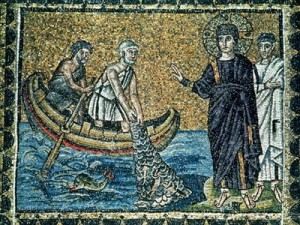From the Gospel according to Mark:
As Jesus passed along the Sea of Galilee, he saw Simon and his brother Andrew casting a net into the lake — for they were fishermen. And Jesus said to them, “Follow me and I will make you fish for people.” And immediately they left their nets and followed him. As he went a little farther, he saw James son of Zebedee and his brother John, who were in their boat mending the nets. Immediately he called them; and they left their father Zebedee in the boat with the hired men, and followed him.
(From the Daily Office Lectionary – Mark 1:16-20 (NRSV) – January 15, 2013.)
 “I don’t know if this story happened, but I know it is true.” One of my favorite stories begins this way. The Gospel accounts do not, but they could . . . .
“I don’t know if this story happened, but I know it is true.” One of my favorite stories begins this way. The Gospel accounts do not, but they could . . . .
One of the things critics of Christianity like to point out is the inconsistency one finds in the gospel accounts of the various events they report. It cannot be denied that the stories of the calling of the initial disciples are contradictory. Mark’s is believed to be the earliest gospel and, therefore, one can assume the one written closest in time to the events described, but even it was probably written about sixty years after this event on the shore of Lake Galilee. Matthew relates the story similarly, but in Luke’s account Jesus first uses Simon Peter’s boat as a place from which to preach to crowds on the shore. Afterward, he tells Simon where to fish for a large catch and Simon actually tells Jesus to leave him because he, Simon, is a sinful human being; Andrew is never mentioned. John’s Gospel tells a very different story in which Andrew, described as a follower of the Baptizer, first encounters Jesus and then a day later introduces Simon to him.
So the community of faith has these three rather different accounts of his initial followers’ encounter with Jesus and the critics find in this a reason to disbelieve them all. I always ask them if their extended families have any favorite stories that are told at family gatherings, you know, the “remember the time Crazy Uncle Harry . . . . ” sorts of tales. My family did. If you were to go to one of my family’s reunions, you’d probably hear that story told. You’d probably hear it told by several different people. And you’d probably hear it told in several different ways. And you’d walk away wondering if you’d actually heard the same story because the details are so widely and wildly different! That’s the way it is with oral transmission of family stories, particularly as they are told by those who weren’t present but have heard them from someone else who heard them from someone else who maybe heard them from someone who was actually there.
A few days ago I heard the author Phyllis Tickle make a distinction between believing that the Bible is actually true and believing that the Bible is factually true. Her contrast is catchier than my own – in Bible studies and in confirmation classes I tell my students to make a distinction between facticity and truth – but the point is the same. Stories may be true (actual) without being factual. We make the Bible and its various forms of literature into something they are not if we insist upon treating them as factually accurate, as though they were scientific history, a reporting of facts. They are not. Biblical literature is concerned with truth, not with fact. Facts are true, but truth is larger than a collection of facts. To insist that truth is only factual devalues beauty, love, the spirit, personal honor, all those things which cannot be scientifically verified.
Were Simon and Andrew, James and John disciples of Jesus? Yes. Were they called as Mark relates? I have no idea. Is there truth in Mark’s story of their being called? Of course there is. Mark wants us to understand and appreciate the urgency of their call, the immediacy of their response to the call, the nature of the ministry to which they were called. These are all matters of truth although Mark’s account may not be factual. We of the modern age with our scientific worldview need to set aside our infatuation with the factual and become passionate about the actual, to give up our lust for facts and fall deeply in love with truth.
I don’t know if this story happened, but I know that it is true . . . .
====================
A request to my readers: I’m trying to build the readership of this blog and I’d very much appreciate your help in doing so. If you find something here that is of value, please share it with others. If you are on Facebook, “like” the posts on your page so others can see them. If you are following me on Twitter, please “retweet” the notices of these meditations. If you have a blog of your own, please include mine in your links (a favor I will gladly reciprocate). Many thanks!
====================
Father Funston is the rector of St. Paul’s Episcopal Church, Medina, Ohio.



Leave a Reply